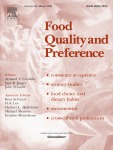What does it mean to check-all-that-apply? Four case studies with beverages
Dublin Core
Título
What does it mean to check-all-that-apply? Four case studies with beverages
Tema
COMPORTAMIENTO DEL CONSUMIDOR
METODOS DE BUSQUEDA
EVALUACION SENSORIAL
BIBLIOGRAFIA NACIONAL QUIMICA
2020
Abstract
The use of check-all-that-apply (CATA) questions in product-focused consumer research on foods and beverages is now common, and the method is known to provide valid sensory product characterisations. Extensive methodological research has been conducted and has supported uptake, but understanding of how consumers complete CATA questions is incomplete, particularly with regard to their decision to select or not a term to describe the sensory properties of products. The present research was situated within this gap, and using open-ended questions participants (n = 636) were asked to describe how they perceived a pair of samples with regard to an attribute and link this to CATA term selection. The results, obtained for taste (‘sweet’ and ‘sour/acidic’) and flavour (‘cinnamon’ and ‘smoky’) confirmed consumers’ ability to accurately perform sensory characterisation tasks. In particular, it was found that: i) the great majority of the consumers accurately used the CATA terms for describing the sensory characteristics they perceived in a sample, ii) when a term was not selected for describing samples, the majority of the consumers indicated that the corresponding sensory attribute was not perceived, iii) when a term was selected for describing only one of the samples in a pair, consumers reported to have perceived a difference in attribute intensity between the samples. Thus, CATA questions remain a desirable option for sensory product characterisation tasks with consumers, but should be selected with thought as they may not always be able to achieve desired sample discrimination due to the binary nature of the responses.
Autor
Jaeger, Sara R.
Beresford, Michelle K.
Lo, Kim R.
Hunter, Denise C.
Chheang, Sok L.
Ares, Gastón
Fuente
Food Quality and Preference v. 80, 2020. -- p. 1-11. --e103794
Editor
Elsevier
Fecha
2020
Derechos
Información sobre Derechos de Autor (Por favor lea este aviso antes de abrir los documentos u objetos) La legislación uruguaya protege el derecho de autor sobre toda creación literaria, científica o artística, tanto en lo que tiene que ver con sus derechos morales, como en lo referente a los derechos patrimoniales con sujeción a lo establecido por el derecho común y las siguientes leyes (LEY 9.739 DE 17 DE DICIEMBRE DE 1937 SOBRE PROPIEDAD LITERARIA Y ARTISTICA CON LAS MODIFICACIONES INTRODUCIDAS POR LA LEY DE DERECHO DE AUTOR Y DERECHOS CONEXOS No. 17.616 DE 10 DE ENERO DE 2003, LEY 17.805 DE 26 DE AGOSTO DE 2004, LEY 18.046 DE 24 DE OCTUBRE DE 2006 LEY 18.046 DE 24 DE OCTUBRE DE 2006) ADVERTENCIA - La consulta de este documento queda condicionada a la aceptación de las siguientes condiciones de uso: Este documento es únicamente para usos privados enmarcados en actividades de investigación y docencia. No se autoriza su reproducción con fines de lucro. Esta reserva de derechos afecta tanto los datos del documento como a sus contenidos. En la utilización o cita de partes debe indicarse el nombre de la persona autora.
Formato
Pdf
Idioma
Inglés
Tipo
Artículo
Identificador
DOI: 10.1016/j.foodqual.2019.103794
Document Item Type Metadata
Original Format
Pdf
- Fecha de agregación
- May 8, 2020
- Colección
- Bibliografía Nacional Química
- Tipo de Elemento
- Document
- Etiquetas
- Comportamiento del consumidor, Evaluación sensorial, Métodos de búsqueda
- Citación
- Jaeger, Sara R., “What does it mean to check-all-that-apply? Four case studies with beverages,” RIQUIM - Repositorio Institucional de la Facultad de Química - UdelaR, accessed July 26, 2024, https://riquim.fq.edu.uy/items/show/6041.
- Archivos

